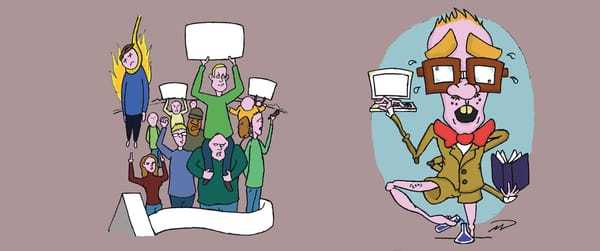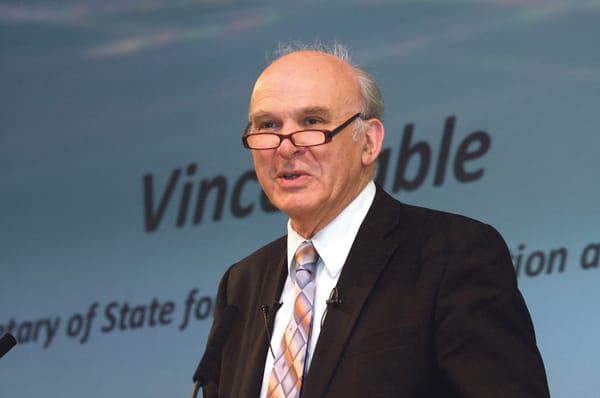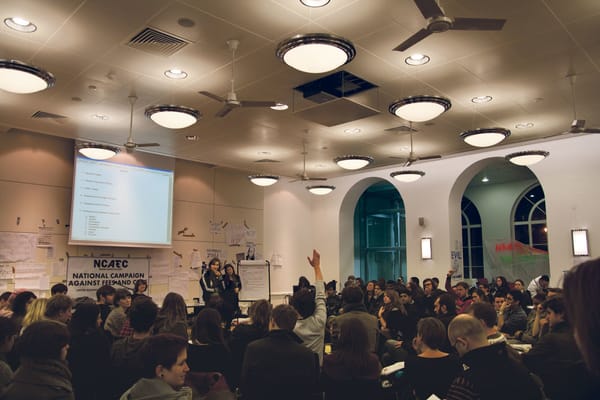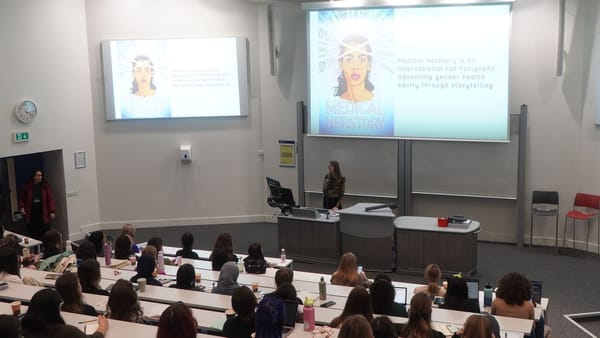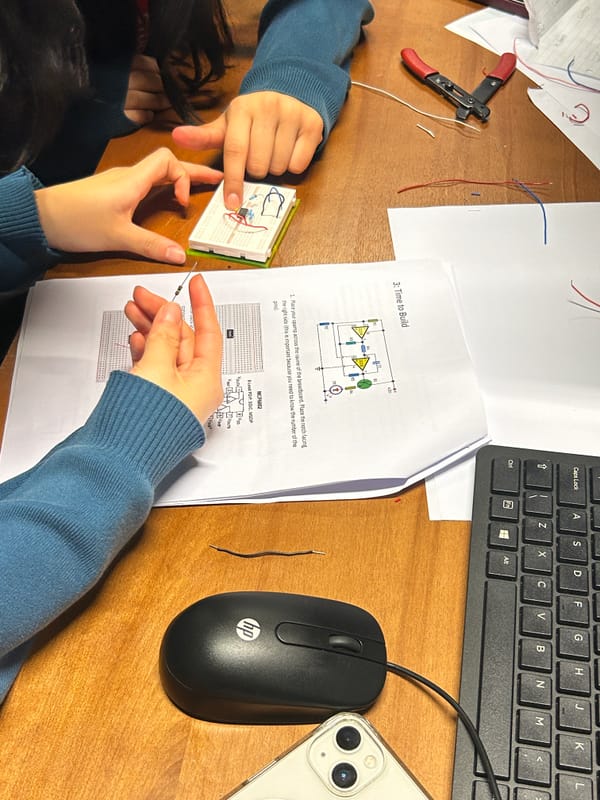Staff and students rail against job cuts
Critics say teaching will be hit hardest as Life Sciences promise teaching review in January

14 academics have been made redundant in a controversial restructure of the Life Sciences department. The academics, who were informed of the decision via email, have until the 7th of January to decide whether to take a voluntary redundancy payoff or appeal and face forced redundancy with no significant payoff. Students and staff have reacted angrily to the cuts with one unaffected member of staff privately telling Felix that academics are “livid” and Emeritus Professor John Mansfield describing the whole process as “unfair, misguided and probably damaging”.
The redundancies come at the end of a 5 month consultation process which began in July and was forced by a cut of £635,000 in the funding that the department receives from central College. The department, which has run a £1.5 million deficit this year, decided to dissolve two sections of research in order to maximize research revenue. Plant and Microbial Sciences and Cell Biology and Functional Genomics are to be replaced by an encompassing division of Integrative Cell Biology. The department defended its actions saying that they were forced to address the long-running Life Sciences deficit which they could no longer ignore.
A major campaign against the cuts has been led by Union President Alex Kendall in the strongest show of student activism at Imperial in years. Over 1,100 students and staff have signed a petition condemning the cuts. Over 400 students and members of staff turned up to a public meeting with the Head of the Life Sciences Department Ian Owens and the Head of the Natural Sciences Maggie Dallman to show their anger at the cuts.
Sacked by email
The method by which staff were informed of their redundancy has also been widely criticized. Letters were sent to those who “[the department] didn’t think was a fit” while emails were sent to all members of staff in order to convey the information to staff at the same time. One member of staff, who is being made redundant, called the manner in which the staff were informed “absolutely shocking” and added “people have been here for a long time and there has been no acknowledgment of their service. We are extremely let down”. Professor Owens defended the chosen method of communication, “The advantage of email is that everyone gets the news simultaneously, but obviously, receiving the news in such a way is gruesome.” Some of the affected staff have worked at Imperial College for over 30 years.
Fears for teaching
The Union, students and members of staff from the department have raised major concerns, particularly about the impact the cuts will have on undergraduate and PhD-level teaching. Two Directors of Undergraduate Studies, two senior tutors and two admissions tutors have been made redundant. Alex Kendall said the changes put “the very running of the Undergraduate Biology and Biochemistry degrees” at risk. Students have also expressed their anger over the loss of arguably the most popular lecturers on the Biology and Biochemistry courses. Sheena Bungsraz, a third year biochemist, said, “the only word to describe how I feel (and I am sure others as well) is disgust. As an international student, I pay £20,000 to Imperial and expect to get a world-class education. We cannot and will not let this happen. Some of the lecturers being “made redundant” are the best ones I have had so far.” Biology and biochemistry freshers in the public meeting went further and said that if they had known about the changes when applying, they “would have never come to Imperial in the first place”.
The department has reaffirmed its commitment to high-quality research-led teaching and has assured students that the breadth and depth of the courses would be unaffected. Dr Pietro Spanu, a reader in Molecular Plant Pathology who hasn’t been made redundant, said that he could not see how this could be the case. He said that the changes were “completely unsettling for all staff” and that it sent the message that a “heavy involvement in teaching will not be taken into account when the chips are down”. The sentiment was shared by Emeritus Professor John Mansfield in a letter to the Head of Department Ian Owens: “Sadly, the present exercise sends out the clear signal that research income is the only parameter that really matters within IC. Anyone who takes on important roles in admin or teaching is making a big mistake in terms of job security.”
There is significant uncertainty regarding undergraduate courses this year. Ian Owens told students that the remaining academics would be able to ensure that there was no change in the quality of teaching but Dr Spanu said that there was a “finite amount of capacity and goodwill” to shoulder the extra work.
Those students on the MRes in Molecular Plant Biology and Biotechnology course are particularly affected. The staff have been told that they must leave by July 2011 but the 12-month course, which costs £19,800 for international students, does not end until October. Ian Owens tried to reassure students by guaranteeing that supervision would be provided on all masters courses. Additionally he hinted that there may be cases where staff are allowed to stay on past July 2011 to complete teaching duties. However it remains to be seen whether this will be the case. Course Representative Tejal Raval said that choosing do a masters at Imperial is “proving to be one of the worst decisions we could have made.” He said that there was anger at the lack of information given to students: “Everything we know is through word of mouth. The university has forgotten us – its masters students!!” He added that the College “should be embarrassed by [its] actions”.
In addition, PhD students have been left in limbo regarding the status of their doctorates. It is unknown whether they will be able to continue their research. Silvia Colucci, a 2nd year PhD student in the hard hit Cell Biology and Functional Genomics section, said that she felt misled about the restructure: “I was told not to worry about it but now my supervisor is being made redundant and I don’t know if there is anybody else at Imperial who will be able to supervise me.” Ian Owens agreed that the uncertainty was regrettable, but said that it was unavoidable until 7th January, by which point all of the affected staff will have decided the date at which they are leaving. However Silvia expressed her anger at the “constant delaying of information. They are always telling us to wait and wait.”
Additionally at the general public meeting, Ian Owens was asked by a postgraduate whether the department would provide all necessary funding and resources to students whose funding was tied to their research and researcher at Imperial. Asked for a categorical answer, Owens simply said “Yes.”
Department promises no reduction in breadth or depth of degrees
The redundancies will have far-reaching consequences for a number of courses on the Biology and Biochemistry degree programmes. There are a significant number of modules and courses which are run by affected staff, in particular the module for Molecular Plant-Microbe Interactions, 4 out of 5 of the staff currently teaching it are being made redundant. The department has made a firm commitment that the “breadth and depth” of the degree will not be affected. Ian Owens admitted that “losing good teachers will improve teaching, but the teaching review that we’re starting in January”, with student input, would. However, Dr. Spanu rejected his assurances saying that “the cuts are having such a deep impact, that inevitably courses will disappear”.
Professor Owens admitted that running the teaching review after the restructure was not ideal, saying that “if it weren’t for the cut [from College] in funding then we would have carried out a teaching review in the summer”. He admitted that some of the staff lost were “fantastic” but said that the changes were driven by a need to address the Department’s long running deficit. In the 2006/07 session, the department was running at a £12 million deficit before being cut down to £1.1 million last year. The fact that the deficit for the 2010/11 session raised for the first time in several years was admitted to have been a major factor behind the current decisions.
In separate news, the College announced a “£140 million innovation investment boost” caused through floating Imperial Innovation Group plc shares on the stock exchange. Additionally the College ran a £14.5 million surplus in 2009, up from £7.1million in 2008; the surplus is believed to have risen significantly in 2010. Maggie Dallman rejected the suggestion that the College didn’t spend enough money on teaching saying “We have invested more money in teaching and we don’t just sit on this surplus and do nothing with it”. She pointed to the quality of accommodation and the gym as proof and added “you [students] would complain about poor accommodation” if we diverted that money to teaching.
Plant Sciences ‘obliterated’
The cuts have been slammed as the end of Plant Sciences at Imperial, a claim that the department has strenuously denied. 9 out of 20 academics from the former Plant and Microbial Sciences (PMS) section have been lost while the impact on the now dissolved Cell Biology and Functional Genomics (CBFG) section has been more dramatic; only 4 out of 9 academics remain.
The method by which the department targeted the sections has come under sustained attack. Both the Union and academics in the affected sections have criticized the department’s use of “spectacularly flawed” statistics to prove that the research output of PMS and CBFG is lower than other sections. The Union have posted data on their website which they claim shows that “there is no difference between research output and that there is a significant difference in teaching hours”. Further criticisms were made in relation to the relocation from the Wye Campus which began in 2004 and only ended this year. In his letter to Ian Owens, Professor John Mansfield said: “The impact of relocation has not been given adequate weighting. [...] To hold the view [that] there was no substantial disruption is simply an insult. [...] There has simply not been enough time since the relocation to allow the section to develop.” Ian Owens addressed both the above issues when he spoke to Felix in October, commenting that he had not seen signs that the section was returning to its previous 5-star research rating. In reference to claims of data misuse, Professor Owens declared: “I would not be presenting the data if I did not believe that it was statistically significant.”

